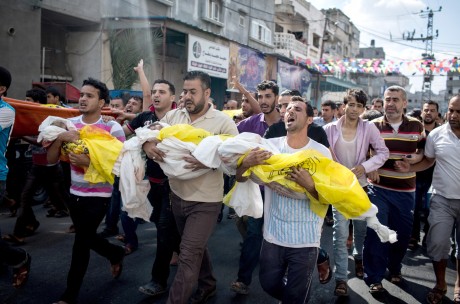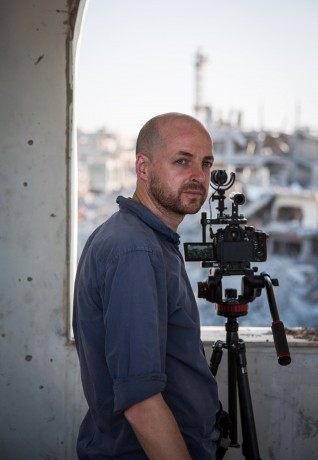
GAZA… Palestinians carry the bodies of 8 members of the Abu Jarad family during their funeral ceremony in Beit Lahiya, Gaza. The 8 were killed when an Israeli airstrike hit their house in Beit Hanoun. Photo by Andrew McConnell
ENNISKILLEN-BORN photojournalist Andrew McConnell has spent the last month amidst a conflict that has seen thousands killed and injured.
Speaking to the Fermanagh Herald from Gaza this week, the 37-year-old described sights that are ‘difficult to come to terms with’ – but expressed that it is ‘vital’ that conflict such as this is brought into the public consciousness.
Andrew has been in Gaza before, initially coming in 2010. While in Gaza he has worked on his ‘surfers of Gaza’ focussing on the impact of the sea – the only part of Gaza not bordered by Israel or Egypt.
But, this is the first time that he has experienced serious conflict there.
“I was never here before during a conflict on this scale. I’ve been here during small escalations, none of the previous wars, but some escalations where there was heightened tension or rocket attacks over three days – this is beyond anything I’ve seen here before,” Andrew explained.
“It’s been extremely bleak some of the things I’ve seen… horrified… the thing that stands out with me is the amount of children I’ve seen that have been killed and it’s been heartbreaking to see some of the scenes in the hospitals, the morgues and the funerals I’ve been to. Far too many funerals, of children especially.”

Andrew McConnell from Enniskillen is pictured working in Gaza
Beginning his career as a press photographer before leaving to concentrate on documentary photography, Andrew has covered conflict in the Democratic Republic of Congo, e-waste in Ghana, the surfers of the Gaza strip, and life in Damascus during the civil war in Syria.
He has held exhibitions across the world, including in New York and London.
But, what motivates him to cover such harrowing stories?
“I think it’s vital that these stories are told so that people are aware of what’s happening. It’s absolutely vital – situations like this can’t go uncovered.
“That’s the job of a journalist to report on the situations that they find whether it’s conflict or not. Conflict is certainly the most difficult issue to report on – but maybe the most important. Some of the actions that take place here, from both sides, not just from one side, these actions must be held accountable, there must be documentation of these events.”
And has he worried for his own safety?
“On occasion. It’s more an issue of tension. There are times I’ve felt afraid, maybe at night-time when the bombings have been really intense. Especially at the beginning when I stayed in the north in a town. Eventually everybody left that town and I left it too but there were a few nights where the airstrikes were very very close, it was hard to sleep.
“During the day when you’re travelling around – there’s a constant tension. You don’t know when a strike will come, it could come at any time from any where.
“So you would worry – you can constantly hear the drones overhead. And they fire rockets – it keeps you on edge all the time, it’s not a nice feeling.”
Andrew described the most harrowing thing that he witnessed as when four children were killed on a beach in Gaza while playing football.
“Those four children were taken to the hospital, and then the morgue. And so I was in the morgue and then of course the family came and the huge crowds. And the funeral procession went through the streets and there was gunfire and the children were buried.
“I can never come to terms with how quickly they bury their dead here – a kid could be playing in the street in the afternoon, and by the time the sun sets could be buried in the ground. And that’s happened on many occasions here. It’s difficult to come to terms with.”
A cease-fire that has lasted two days, was still in place at the time of press between Israel and Hamas, while a solution to the conflict was sought in Cairo, Egypt.
Andrew expects to return to his home in Beirut, Lebanon sometime next month.








